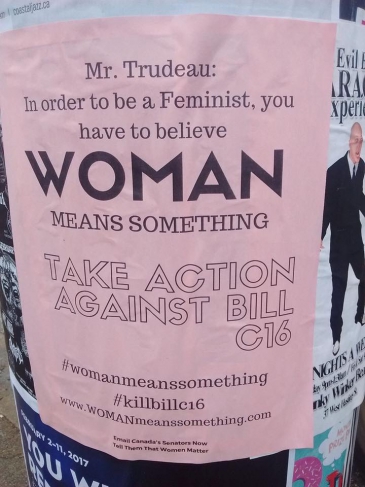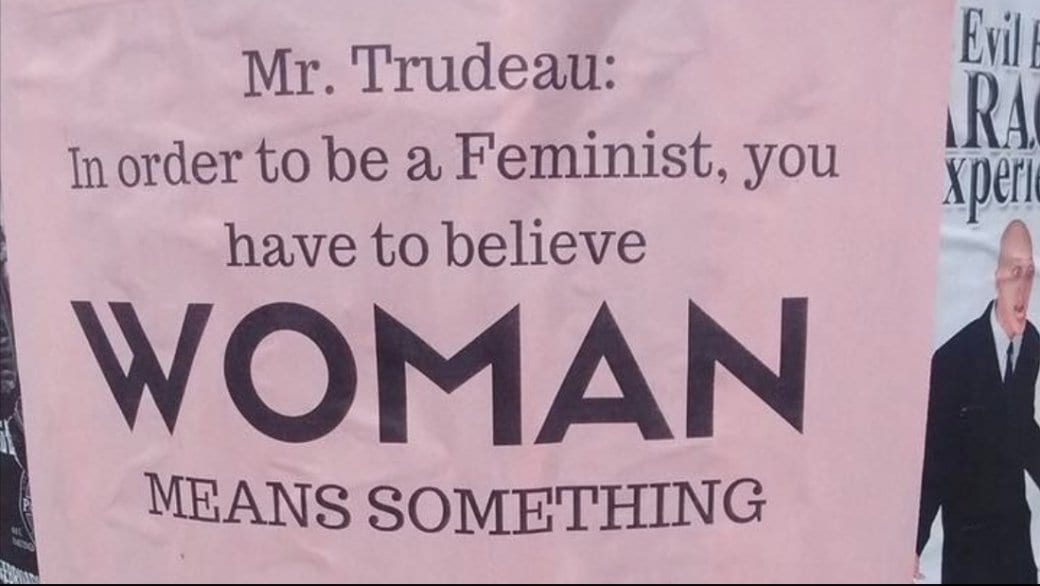Posters recently taped to poles in the Davie Village have raised concern for some observers who say they’re advertising a campaign that’s anti-trans.
The posters, which appeared on Davie Street in January 2017, state:

The posters direct readers to visit the group’s online campaign opposing Bill C-16, which seeks to amend the Canadian Human Rights Act to prohibit discrimination on the basis of gender identity and gender expression.
“It’s very alarming. But also it’s expected,” says Morgane Oger, chair of the Trans Alliance Society and the BC NDP candidate for Vancouver-False Creek, who first encountered the posters while she was canvassing in nearby Yaletown.
“Even though the posters are not inherently hateful they do raise concerns,” she says. “Basically what they show is an insensitivity and a bigotry, right? Because the bigotry that they show is [trans people] don’t exist and we’re not telling the truth.”
The “Woman Means Something” campaign was founded by Paul Dirks, lead pastor at the New West Community Church in New Westminster. Dirks declined Daily Xtra’s request for a phone interview but confirmed his campaign paid for a city-wide poster distribution. He says no specific neighbourhood or community was targeted.
The campaign’s website describes Bill C-16 as “a Bill that completely undermines and destroys women’s rights, freedoms, protections, and identity under the law” and says “any legislation that pits gender vs sex, or defines ‘woman’ such that it is meaningless, will result in tremendous harm to women, girls, and their rights.”
The campaign purports to have a range of supporters including radical feminists, gays and lesbians, though its membership size is unclear. On his Twitter account, Dirks describes himself as a social conservative who is “fighting the mainstream media trans-narrative for the sake of women who will bear the terrible consequences.”
Oger says the campaign’s central argument — that the definition of woman needs to be protected — is a “laughable fallacy.”
“These people don’t even understand what the law is, and they don’t understand this has nothing to do with protecting or not protecting what a woman is or what a woman isn’t,” she says.
Bill C-16 simply aims to provide trans people with the same protections afforded to others on the basis of race or religion, she explains.
Oger says Dirks’ campaign is out of step with the majority of Canadians.
Last September, a survey from the Angus Reid Institute found that 84 percent of Canadians support expanding non-discrimination laws to include gender identity and 58 percent say transgender people should use the washrooms they feel most comfortable using, rather than having that choice determined by laws or policies.
While popular opinion and, increasingly, provincial legislation in Canada may be shifting to support trans people, Oger says campaigns like “Woman Means Something” can still cause concern.
“Ultimately, populist xenophobic zeal can be drummed up and fired up just like what’s been done in the US in the Trump election, and therefore it’s always a risk that extremist social conservative outliers get a voice,” she says.
Sometimes “terrible messages get traction,” she warns, adding that she hopes this campaign does not gain any traction by misleading Canadians.
Bill C-16 is currently in its second reading in the Senate.

 Why you can trust Xtra
Why you can trust Xtra


